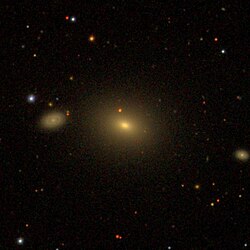NGC 76
Appearance
| NGC 76 | |
|---|---|
 SDSS image of NGC 76 | |
| Observation data (J2000 epoch) | |
| Constellation | Andromeda |
| Right ascension | 00h 19m 37.79033s[1] |
| Declination | +29° 56′ 01.9218″[1] |
| Redshift | 0.024734[2] |
| Heliocentric radial velocity | 7323 km/s[2] |
| Distance | 322.9 Mly (99.01 Mpc)[3] |
| Apparent magnitude (B) | 14.0[2] |
| Characteristics | |
| Type | S0[4] |
| Other designations | |
| UGC 185, MCG +05-01-072, PGC 1267[2] | |
NGC 76 is a lenticular galaxy estimated to be about 320 million light-years away in the constellation of Andromeda. It was discovered by Guillaume Bigourdan from France in 1884 and its magnitude is 13.1.[4]
References
[edit]- ^ a b Brown, A. G. A.; et al. (Gaia collaboration) (August 2018). "Gaia Data Release 2: Summary of the contents and survey properties". Astronomy & Astrophysics. 616. A1. arXiv:1804.09365. Bibcode:2018A&A...616A...1G. doi:10.1051/0004-6361/201833051.
- ^ a b c d "NGC 76". SIMBAD. Centre de données astronomiques de Strasbourg. Retrieved 2020-12-12.
- ^ Crook, Aidan C.; Huchra, John P.; Martimbeau, Nathalie; Masters, Karen L.; Jarrett, Tom; Macri, Lucas M. (2007). "Groups of Galaxies in the Two Micron All Sky Redshift Survey". The Astrophysical Journal. 655 (2): 790–813. arXiv:astro-ph/0610732. Bibcode:2007ApJ...655..790C. doi:10.1086/510201. S2CID 11672751.
- ^ a b "NGC Objects: NGC 50 - 99".
External links
[edit] Media related to NGC 76 at Wikimedia Commons
Media related to NGC 76 at Wikimedia Commons
